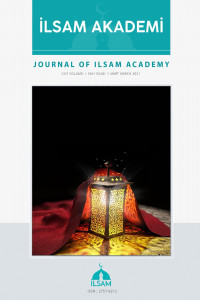SEYYİD KUTUB’UN FİZİLAL’İL KUR’AN TEFSİRİNİN BEYÂNU’L-HAK VE HAYAT KAYNAĞI KUR’AN TEFSİRLERİNE ETKİSİ
Büyük toplumsal dönüşümlerin yaşandığı 20 yy. da bir yandan modern Batı medeniyeti etkinliğini arttırmış, öte yandan İslam toplumları büyük bir krizin eşiğine gelmişlerdir. Bu derin buhranın hissedildiği Mısır’da ise Seyyid Kutub, yönetimsel dönüşümün etkisini en ağır şekilde yaşamış, İhvan hareketi ile beraber Mısır yönetiminin yoğun baskısına maruz kalmıştır. Böyle bir ortamda Fizilal’il Kur’an’ı yazan Kutub, yazdığı tefsiri ile kitleleri etkisi altına almıştır. Bahse konu etki Türkiye’de de yoğun bir şekilde hissedilmiş ve 1970’li yıllar itibariyle Fizilal yoğun tercüme faaliyetlerine konu olmuştur. Bu tercüme faaliyetleri sonucunda bir yandan tefsir kaynağı olarak geniş kitleler tarafından okunurken öte yandan yazıldığı dönemin toplumsal sorunlarındaki benzerlikler karşısında çağdaşı olan tefsirlere bir öncü olma misyonunu da ifa etmiştir. Bu misyonun yansımasından hareketle makalemizde Fizilalin Türkiye’de yazılan Beyânu’l-Hak ve Hayat Kaynağı Kur’an tefsirlerine etkisi incelenmektedir. İncelemede öne çıkan bazı temel kavramlar ayetler ışığında ele alınmış, böylece ayet/kavram bağlamında Fizilalin etkisi araştırılmıştır.
Sayyid Qutb's Fizilal'il Qur'an Commentary on the Qur'an Tafsirs Hayat Kaynagi Qur’an and Beyan'ul-Hak
In the 20th century, when great social transformations were experienced, modern Western civilization increased its effectiveness, on the other hand, Islamic societies came to the brink of a great crisis. In Egypt, where this deep depression was felt, Qutb experienced the effects of the administrative transformation most severely and along with the Brotherhood movement, it was exposed to intense pressure from the Egyptian administration. In such an environment, Qutb, who wrote Fizilal, influenced the masses with his commentary. The wind of the said effect blew in Turkey as well, and as of the 1970s, Fizilal has been the subject of intense translation activities. As a result of these translation activities, while being read by large masses as a source of tafsir, on the other hand, it fulfilled the mission of being a pioneer for contemporary tafsirs in the face of the similarities in the social problems of the period in which it was written. Based on the reflection of this mission, in our article, the effect of Physilial on the interpretations of the Beyan'ul-Hak and the Source of Life Qur'an written in Turkey is examined through some key concepts. Based on the reflection of this mission, our article examines the effect of Physilial on the interpretations of Beyânu'l-Hak and Life Source Qur'an written in Turkey. Some of the main concepts that come to the fore in the analysis are discussed in the light of the verses; thus, the effect of Physilal in the context of the verse/concept was investigated.
___
- Duman, M. Zeki. Beyânu’l-Hak Kur’an’ı Kerim’in Nüzul Sırasına Göre Tefsiri, Ankara:
Fecr Yayınları, 2006.
- Hilal Dergisi, İstanbul, 1966, S. 56, 5/2
- İbn Kesir, İsmail ed-Dımeşki. Tefsiru’l-Kur’ani’l-Azim, Mısır: Mektebe Evlâd eş-şeyh
litturâs, 2000.
- Kur’an Yolu, Erişim 15 Aralık 2021. https://kuran.diyanet.gov.tr/Tefsir/
- Kutub, Seyyid. Fizilal’il-Kur’an, Kahire: Dâr’uş-Şurûk, 1985.
- Öztürk, Mustafa. Kur’an ve Tefsir Kültürümüz, Ankara: Ankara Okulu Yayınları, 2008.
- Şimşek, M. Said. Hayat Kaynağı Kur’an Tefsiri, İstanbul: Beyan Yayınları, 2012.
- Taberi, Muhammed b. Cerir, Câmiu’l-Beyân an-Te’vil’il-Kur’an, Kahire: Dâru’l-Meârif, 1954.
- Tohum Dergisi, Ekim 1966; Diriliş dergisi Eylül 1966.
- Türkmen, Hamza. “Seyyid Kutub Türkiye’de Nasıl Algılandı?”, Türkiye’de İslâmcılık Düşüncesi ve Hareketi Sempozyumu, İstanbul: Zeytinburnu Belediyesi Kültür Yayınları, 2013.
